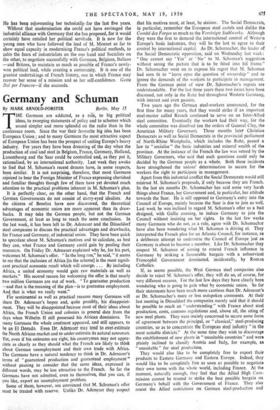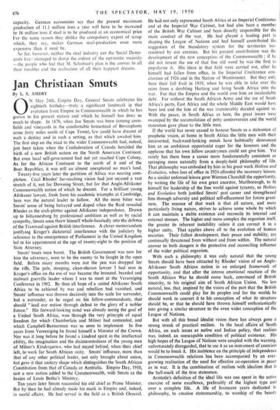Germany and Schuman
By MARK ARNOLD-FORSTER Berlin, May 1,5
THE Germans , are addicted, as a rule, to big political ideas, to sweeping statements of policy and to schemes which
sound simpler and more splendid on the radio than in the conference room. Since the war their favourite big idea has been European Union ; and to many Germans the most attractive aspect of European Union has been the prospect of uniting Europe's heavy industry. For years they have been dreaming of the day when the production of coal steel in Belgium, France, Germany, Holland, Luxembourg and the Saar could be controlled and, as they put it, rationalised, by an international authority. Last week they awoke to find that M. Schuman's recent dreams have, in some respects, been similar. It is not surprising, therefore, that most Germans rejoiced to hear the Foreign Minister of France expressing cherished and familiar thoughts though few of them have yet devoted much attention 4o the practical problems inherent in M. Schuman's plan.
It is perfectly clear, on the other hand, that the French and German Governments do not consist of starry-eyed idealists. As the citizens of Benelux have now discovered, the theoretical advantages of economic union are more apparent than its draw- backs. It may take the German people, but not the German Government, at least as long to reach the same conclusion. In the last week, it has been left to Dr. Adenauer and the Dusseldorf steel companies to discuss the practical advantages and drawbacks, for France and Germany, of industrial union. They have been quick to speculate about M. Schuman's motives and to calculate, as best they can, what France and Germany could gain by pooling their resources. On Friday Dr. Adenauer explained why he, for his part, welcomes M. Schuman's offer. " In the long run," he said, " it seems to me that the inclusion of Africa [in the scheme] is the most signifi- cant practical economic result which will emerge.... By including Africa, a united economy would gain raw materials . as well as markets." His second reason for welcoming the offer is that nearly two million Germans are out of work. " To guarantee production —and that is the meaning of the plan—is to guarantee employment. And that is what we really want."
eor sentimental as well as practical reasons many Germans will share Dr. Adenauer's hopes and, quite possibly, his disappoint- ment. They will be disappointed because most of their ideas about Africa, the French Union and colonies in general date from the days when Wilhelm II still possessed his African dominions. To many Germans the whole continent appeared, and still appears, to be an El Dorado. Even Dr. Adenauer may tend to over-estimate the North African market and to under-estimate its natural resources. Yet, even if his estimates are right, his countrymen may not appre- ciate as clearly as they should what the French are likely to think about German unemployment and their own trade with Africa. The Germans have a natural tendency to think in Dr. Adenauer's terms of " guaranteed production and guaranteed employment " without pausing to consider that the same ideas, expressed in different words, may be less attractive to the French. So far the Germans have not admitted, even to themselves, that you can, if you like, export an unemployment problem.
Some of them, however, are convinced that M. Schuman's offer must be treated with reserve. Unlike Dr. Adenauer they suspect that his motives must, at least, be sinister. The Social Democrats, in particular, remember the European steel cartels and dislike the Comiti des Forges as much as the Vereinigte Stahlwerke. Although they were the first to demand the international control of Western Europe's basic industries, they will be the last to agree to their control by international capital. As Dr. Schumacher, the leader of the Social Democratic opposition, said on Wednesday last week: " One cannot say Yes' or No' to M. Schuman's suggestion without seeing the picture that is to be fitted into hii frame."
Dr. Schumacher went on to express his regret that M. Schuman had seen fit to " leave open the question of ownership " and to ignore the demands of the workers to participate in management.
From the German point of view Dr. Schumacher's regrets are understandable. For the last three years these two issues have been discussed, not only in the Ruhr but throughout Western Germany, with interest and even passion.
Two years ago the German steel-workers announced, for the first time for many years, that they would strike if an important steel-master called Reusch continued to serve on an Inter-Allied steel committee. Eventually the workers had their way, for the whole committee was dissolved (on the orders of General Clay, the American Military Governor). Three months later Christian Democrats as well as Social Democrats in the provincial parliament of North-Rhine Westphalia, which includes the Ruhr, passed a law to " socialise " the basic industries and mineral wealth of the province. At the instance of the French the law was vetoed by the Military Governors, who said that such questions could only be decided by the German people as a whole. Both these incidents have strengthened the unions' determination to secure for the workers the right to participate in management.
Apart from this industrial conflict the Social Democrats would still mistrust M. Schuman's proposals, if only because they are French. In the last six months Dr. Schumacher has said some very harsh things about France, her Government and, in particular, her attitude towards the Saar. He is still opposed to Germany's entry into the Council of Europe, mainly because the Saar is due to join as well. Last week he was inclined to regard M. Schuman's offer as a bait designed, with Gallic cunning, to induce Germany to join the Council without insisting on her rights. In the last few weeks many Germans who do not, as a rule, agree with Dr. Schumacher have also been wondering what M. Schuman is driving at. They interpreted the French plan for an Atlantic Council, for instance, as a deliberate attempt to undermine the Council of Europe just as Germany is about to become a member. Like Dr. Schumacher they suspect M. Schuman of aiming to extend French influence in Germany by striking a favourable bargain with a subservient Francophil Government dominated, incidentally, by Roman Catholics.
If, as seems possible, the West German steel companies also decide to reject M. Schuman's offer, they will do so, of course, for very different reasons. For the last few days they have clearly been wondering who is going to gain what by economic union. So far their statements have been much more cautious than Dr. Adenauer's or Dr. Schumacher's more or less outspoken comments. At their last meeting in Diisseldorf the companies merely said that it should be possible to reach an " understanding " with France about steel production, costs, customs regulations and, above all, the siting of new steel plants. They were mainly concerned to secure some form of agreement between the principal, or " classical," steel-producing countries, so as to concentrate the European steel industry " in the most suitable districts." At the same time they wish to discourage the establishment of new plants in " unsuitable countries " and were plainly inclined to classify Austria and Italy, for example, as " unsuitable " for steel production.
They would also like to be completely free to export their products to Eastern Germany and Eastern Europe. Indeed, they would like to be completely free as soon as possible to negotiate their own terms with the whole world, including France. At the moment, naturally enough, they 'feel that the Allied High Com- mission cannot be trusted to strike the best possible bargain on Germany's behalf with the Government of France. They also resent the Allied restrictions on German steel-production and capacity. German economists say that the present maximum production of 11.1 million tons a year will have to be increased to 16 million tons if steel is to be produced at an economical price For the same reason they 'dislike the compulsory export of scrap which, they say, makes German steel-production even more expensive than it need be.
So far, however, neither the steel industry nor the Social Demo• crats hay managed to damp the ardour of the optimistic majority —the people who feel that M. Schuman's plan is the answer to all their troubles and the realisation of all their happiest dreams.











































 Previous page
Previous page